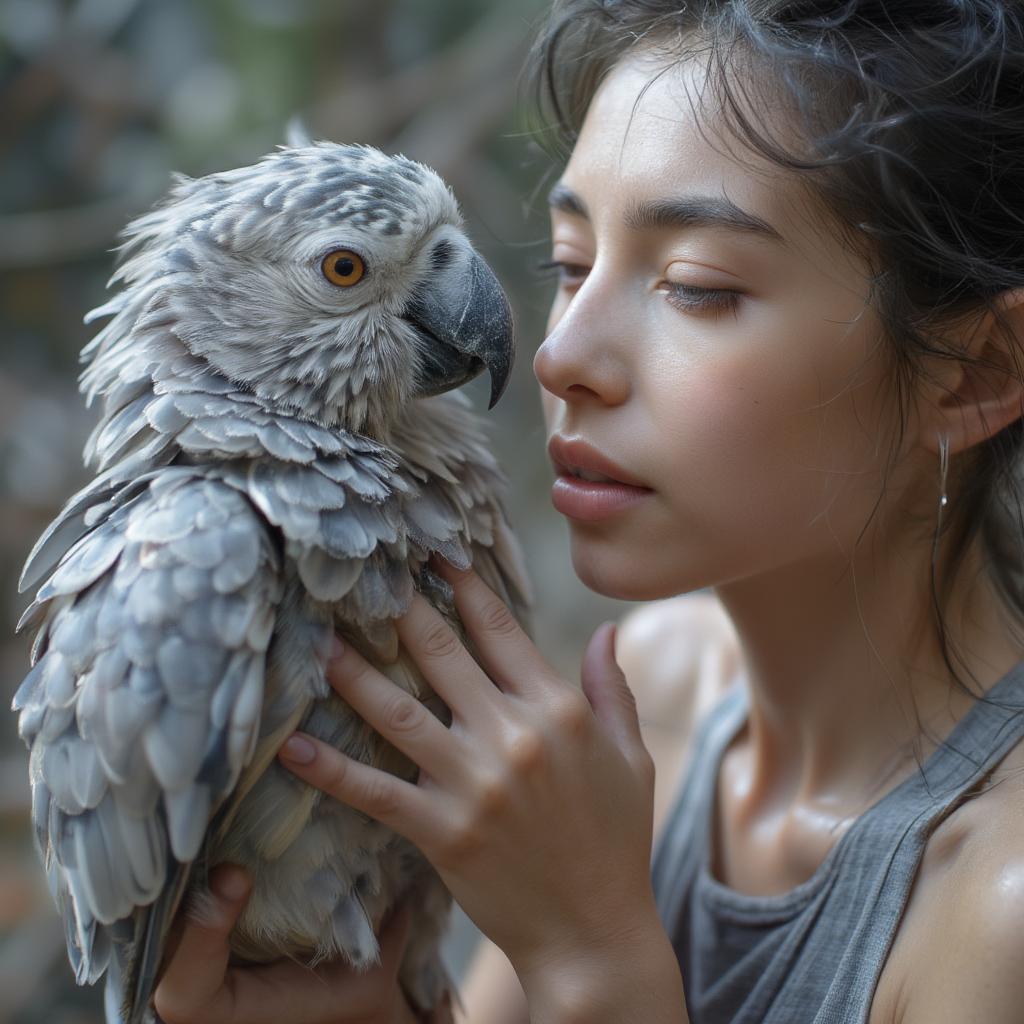Do Parrots Love Their Owners? This age-old question sparks debate among bird enthusiasts. While parrots can’t express love in the same way humans do, they display affection through complex behaviors and social cues. Understanding these nuances helps owners build stronger, more fulfilling bonds with their feathered companions.
Signs Your Parrot Loves You: More Than Just Mimicry
Parrots are intelligent, social creatures who thrive on interaction. Their “love” manifests as a combination of bonding, dependency, and enjoyment of your company. So, do parrots love their owners? Let’s explore the tell-tale signs:
-
Physical Affection: Gentle nibbling, preening your hair, and cuddling close are classic signs of parrot affection. They signify trust and a desire for closeness, mimicking behaviors they’d display with their flock in the wild.
-
Vocalizations: Parrots often have unique calls and whistles specifically for their favorite person. While mimicry is impressive, personalized vocalizations indicate a deeper bond.
-
Excited Greetings: An enthusiastic display of flapping wings, tail wagging, and excited chirping when you enter the room demonstrates your parrot’s genuine pleasure at your presence.
-
Sharing Food: Offering you a piece of their favorite treat is a significant gesture. In the parrot world, sharing food is a sign of deep trust and bonding, equivalent to a human sharing a cherished possession.
-
Seeking Your Attention: A parrot that constantly seeks your attention through playful antics, vocalizations, or gentle nudges wants to be involved in your life and enjoys your company.
Understanding Parrot Body Language: A Key to Their Heart
Like any relationship, communication is crucial. Learning your parrot’s body language can reveal a wealth of information about their feelings and emotional state.
-
Dilated Pupils: While sometimes a sign of excitement, consistently dilated pupils coupled with other affectionate behaviors often indicate happiness and contentment in your presence.
-
Head Bobbing and Dancing: These playful movements are clear indicators of a happy and engaged parrot, demonstrating their enjoyment and desire to interact.
-
Soft Chatter: Quiet, gentle chattering often signifies contentment and relaxation, similar to a cat’s purring. It shows they feel safe and comfortable around you.
Building a Loving Bond with Your Parrot: Patience and Consistency
Developing a loving relationship with your parrot takes time, patience, and understanding. It’s not about instant gratification but about building trust and mutual respect.
-
Positive Reinforcement: Rewarding desired behaviors with praise, treats, or head scratches encourages positive interactions and strengthens the bond between you.
-
Quality Time: Dedicate time each day to interact with your parrot, playing games, talking, or simply enjoying each other’s company.
-
Respect Their Boundaries: Just like humans, parrots have moods and need personal space. Learning to recognize and respect their boundaries is essential for building a healthy relationship.
Do Parrots Love Their Owners? The Verdict is In
So, do parrots love their owners? While they may not express love in the same way we do, the evidence suggests they form strong bonds, enjoy our company, and display affection in their own unique ways. By understanding their behavior and investing in the relationship, you can experience the rewarding companionship of a loving, feathered friend.
 Parrot Preening Owner's Hair
Parrot Preening Owner's Hair
FAQ
- How can I tell if my parrot is happy?
- What are the best ways to bond with my parrot?
- Do all parrots show affection the same way?
- How much time should I spend with my parrot each day?
- What are signs of a stressed or unhappy parrot?
- Can parrots bond with more than one person?
- How can I teach my parrot new tricks and behaviors?
Related Questions and Further Reading
- Exploring Parrot Intelligence and Emotions
- Understanding Parrot Vocalizations and Communication
- Building a Strong Bond with Your Feathered Friend
- Tips for Training and Socializing Your Parrot
If you need further assistance, please contact us at Email: contact@daiduongtranhba.com, address: Michigan Ave, Suite 3100, Chicago, IL 60611, USA. We have a 24/7 customer support team.


